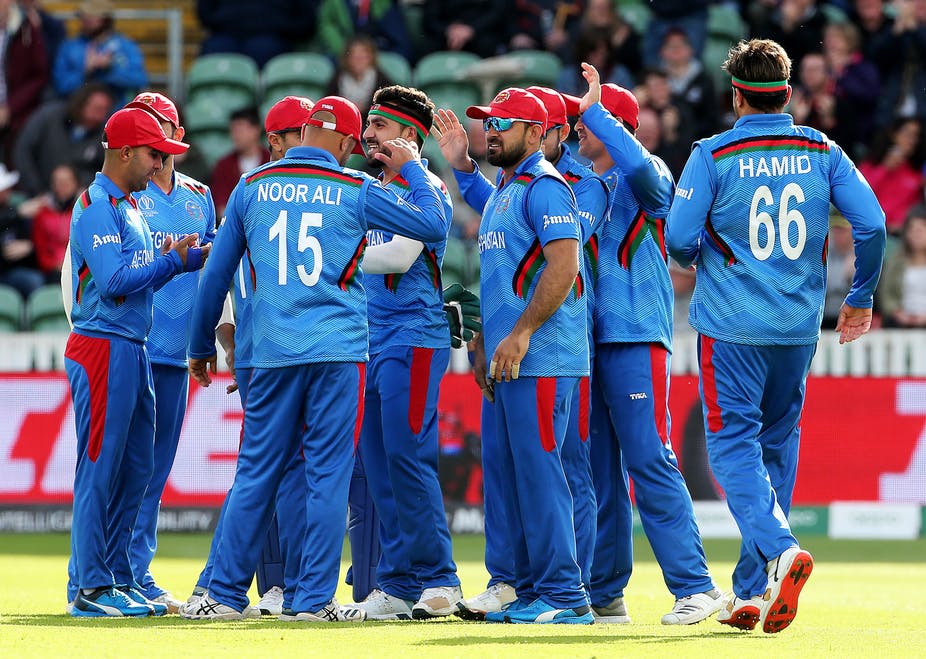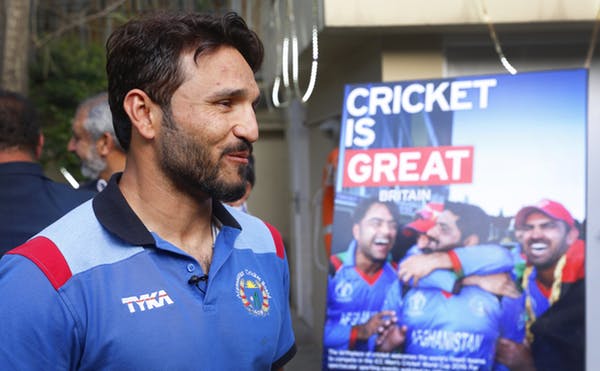By Phillipa Velija/The Conversation
The latest data from the Office of National Statistics estimates there are about 76,000 people identifying as Afghan nationals living in the UK. When their cricket team played their first match in the 2019 ICC Cricket World Cup on June 1, it must have felt to their Australian opponents as if a fair proportion of that population had come to Bristol to cheer their team on.
As it turned out, Australia – a giant of the cricket world who has won the World Cup five times – beat Afghanistan quite easily, as expected. But the spirit in which the Afghanis played and the ebullience of their supporters in the crowd won them many friends among neutrals, who were quite happy to cheer them on against the “old enemy” from down under.
 The Afghanistan team celebrate taking a wicket in its match against New Zealand on Saturday/Mark Kerton, PA Wire
The Afghanistan team celebrate taking a wicket in its match against New Zealand on Saturday/Mark Kerton, PA Wire
To some, the inclusion of Afghanistan on the world sporting stage may come as a surprise, as the country is more popularly known for its long history of war, conflict and colonial and imperial rule than sporting prowess. But this is its second men’s World Cup tournament and the national team won many admirers for the way in which it beat Scotland in the 2015 World Cup held in Australia and New Zealand.
Like most countries that were former territories of the British Empire, cricket was played in Afghanistan during the 19th century but the the Afghan Cricket Federation – now known as the Afghanistan Cricket Board (ACB) – wasn’t formed until 1995. The Taliban lifted its ban on cricket in 2000 and the first national team was formed.
The team has been more recently supported by powerful political groups, such as the Hezb-e Islami/Gulbuddin, which congratulated them after a victory against Pakistan. Before a 2012 one-day international between Afghanistan and Pakistan, Taliban representatives contacted the ACB to offer support. These groups perhaps saw cricket as a way to demonstrate the legitimacy of their regime, locally and globally.
From 2001, the team quickly progressed and made the semi-final of the Asian Cricket Council Trophy in 2006. In April 2009, Afghanistan gained one-day international status – an incredible achievement in just eight years which they justified with their World Cup win over Scotland in 2015.
Coming Of Age
In 2017, Afghanistan was awarded full member status of the ICC and played its first test match in 2018, losing heavily to India, one of the game’s giants. But they recovered to win a one-off test against Ireland in March 2019. Playing in test “whites” is significant as it reflects a form of acceptance on to cricket’s world stage.
But this appearance as being global equals in cricketing terms masks underlying tensions between former colonial powers and colonized countries about how cricket should be played. What forms of cricket are most valued – test cricket or limited overs competitions – remain contested, with the Western countries tending to value the longer form of the game and with Asian countries generally preferring one-day cricket.
 Afghanistan national cricket team captain Gulbadin Naib at an event for the Cricket World Cup 2019 at the British embassy in Kabul in April/Jawad Jalali/ EPA-EFE
Afghanistan national cricket team captain Gulbadin Naib at an event for the Cricket World Cup 2019 at the British embassy in Kabul in April/Jawad Jalali/ EPA-EFE
As part of the shift in dominance in the game – and the growing power of the Asian countries, the Asian Cricket Council has helped support the Afghan team alongside the ICC providing funding to support the development of cricket in the region. Pakistan, Sri Lanka and India – which recently offered use of training facilities in Uttar Pradesh – have supported the development of the Afghan team, which strengthens cricket in the South Asia region. At grassroots level, The Afghan Connection, a UK based charity, has – in partnership with the MCC – supported cricket development in Afghanistan by building pitches and training coaches.
National Identity
Cricket as a metaphor for the Afghan nation was played out in the BBC’s 2012 film Afghan Cricket Club – Out of the Ashes. Despite unstable political conditions in Afghanistan, the film follows men learning to play the cricket and documents their friendships, passion and humor. Cricket was portrayed as the vehicle through, which against all the odds, as refugees living in makeshift camps in Pakistan, these men found hope, salvation and a reason to feel proud of their nation.
This popular metaphor offers a romantic view that cricket is the way to bring peace to Afghanistan. Globally, the success of Afghan cricket has captured public imagination because of Afghanistan’s perceived inferiority globally – in cricketing and socioeconomic terms – to the West. Beating “them”, the former imperial and colonial nations, at their own game, mirrors broader power struggles that ordinary Afghans across the diaspora negotiate and challenge on a daily basis.
Despite its popularity in Afghanistan, cricket does not embrace everyone. Women’s cricket is not supported by the state or any other social institution. A women’s cricket team was formed in 2010 but disbanded in 2014 by the ACB, partly due to lack of funds and also due to death threats which threatened the girls and women’s safety.
In this context, girls and women continue to organize their own teams and they play cricket to challenge ideas of Muslim female fragility, and create their own spaces to play on their own terms. This is why the ICC has granted Afghanistan full test status, despite regulations which state that new member nations must have a women’s national team to be eligible. This exception reproduces gender inequalities and is contradictory to the ICC’s commitment to the global development of women’s cricket.
On Tuesday, June 18, at the Old Trafford cricket ground in Manchester, 19,000 spectators will attend and millions more will watch and listen on TV and radio. Many of these will be Afghan fans hoping to see their team excel against England – the host country and favorite to win the competition. The match will no doubt evoke media narratives about peace, war and ongoing conflict – but even if history is made on the cricket pitch, and huge celebrations follow, we need remember the Afghan people and their ongoing day-to-day realities beyond the boundary.
Philippa Velija is head of education and sociology in the School of Sport, Health and Social Sciences at Solent University. This article is republished from The Conversation under a Creative Commons license.
–
Comments welcome.
Posted on June 12, 2019


